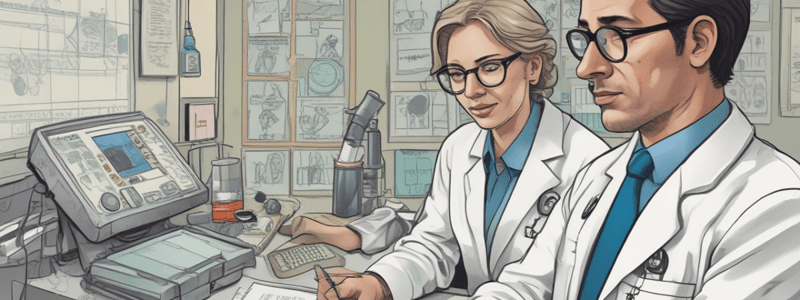Podcast
Questions and Answers
What is the importance of coordinating communication with non-laboratory personnel?
What is the importance of coordinating communication with non-laboratory personnel?
- To only process and collect laboratory specimens
- To monitor and adjust communication according to best practices and patients' needs (correct)
- To only communicate with laboratory technicians
- To only document laboratory reports
What is the role of computer programs in managing workflow and communication?
What is the role of computer programs in managing workflow and communication?
- To only monitor laboratory technicians
- To only document patient reports
- To manage workflows and communication specific to each provider of services (correct)
- To only manage laboratory workflows
What is an important aspect of effective communication?
What is an important aspect of effective communication?
- Using standard terminology and abbreviations (correct)
- Using laboratory-specific terminology
- Using only handwritten documentation
- Using only verbal communication
What is the purpose of recording contact notes on laboratory reports or laboratory logs?
What is the purpose of recording contact notes on laboratory reports or laboratory logs?
What role do computers and networks play in managing patient care?
What role do computers and networks play in managing patient care?
What is the purpose of software that links test results to provider alerts?
What is the purpose of software that links test results to provider alerts?
What is the importance of familiarizing oneself with software, communication methods, and processes within an organization?
What is the importance of familiarizing oneself with software, communication methods, and processes within an organization?
What is the role of laboratory information systems in communication?
What is the role of laboratory information systems in communication?
Why do organizations establish policies and procedures for communication about specimen processing and collection?
Why do organizations establish policies and procedures for communication about specimen processing and collection?
What is the purpose of software that supports the ordering, processing, and routing of specimens?
What is the purpose of software that supports the ordering, processing, and routing of specimens?
Phlebotomists only interact with laboratory technicians and physicians.
Phlebotomists only interact with laboratory technicians and physicians.
Standard terminology and abbreviations are not important in effective communication.
Standard terminology and abbreviations are not important in effective communication.
Computer interactions do not provide documentation for managers to review.
Computer interactions do not provide documentation for managers to review.
Software does not contribute to an effective and efficient communication process.
Software does not contribute to an effective and efficient communication process.
Each organization establishes policies and procedures for communication about patient care.
Each organization establishes policies and procedures for communication about patient care.
Phlebotomists do not need to familiarize themselves with software, communication methods, and processes within their organization.
Phlebotomists do not need to familiarize themselves with software, communication methods, and processes within their organization.
Laboratory information systems do not require knowledge of software and hardware components.
Laboratory information systems do not require knowledge of software and hardware components.
Documentation only includes laboratory reports.
Documentation only includes laboratory reports.
Software does not support the ordering, processing, and routing of specimens.
Software does not support the ordering, processing, and routing of specimens.
Computers and networks do not play a role in the scheduling, managing, and processing of patients, specimens, and clinical workflow.
Computers and networks do not play a role in the scheduling, managing, and processing of patients, specimens, and clinical workflow.
Flashcards are hidden until you start studying
Study Notes
Coordinating Communication with Non-Laboratory Personnel
- Interact with various medical professionals, including physicians, nurses, laboratory technicians, respiratory therapists, and radiologic technologists as a phlebotomist.
- Coordinate communication with non-laboratory personnel about processing and collection, and adjust according to best practices and patient needs.
- Computer programs manage workflows and communication specific to each service provider.
- Effective communication involves using standard terminology, abbreviations, and accurate documentation.
Documentation and Compliance
- Record contact notes on laboratory reports or laboratory logs as part of documentation.
- Computer interactions provide documentation that managers can monitor and review for HIPAA compliance and quality of patient care.
Technology in the Laboratory
- Computers and networks play key roles in scheduling, managing, and processing patients, specimens, and clinical workflow.
- Familiarize yourself with software, communication methods, and processes within your organization.
Laboratory Information Systems
- Software supports the ordering, processing, and routing of specimens, streamlining workflows.
- Software links test results to provider alerts depending on preset values, contributing to an effective and efficient communication process.
- Each organization establishes policies and procedures for communication about specimen processing and collection.
- Knowledge of software and hardware components is required to communicate effectively with non-laboratory personnel using laboratory information systems.
Coordinating Communication with Non-Laboratory Personnel
- Interact with various medical professionals, including physicians, nurses, laboratory technicians, respiratory therapists, and radiologic technologists as a phlebotomist.
- Coordinate communication with non-laboratory personnel about processing and collection, and adjust according to best practices and patient needs.
- Computer programs manage workflows and communication specific to each service provider.
- Effective communication involves using standard terminology, abbreviations, and accurate documentation.
Documentation and Compliance
- Record contact notes on laboratory reports or laboratory logs as part of documentation.
- Computer interactions provide documentation that managers can monitor and review for HIPAA compliance and quality of patient care.
Technology in the Laboratory
- Computers and networks play key roles in scheduling, managing, and processing patients, specimens, and clinical workflow.
- Familiarize yourself with software, communication methods, and processes within your organization.
Laboratory Information Systems
- Software supports the ordering, processing, and routing of specimens, streamlining workflows.
- Software links test results to provider alerts depending on preset values, contributing to an effective and efficient communication process.
- Each organization establishes policies and procedures for communication about specimen processing and collection.
- Knowledge of software and hardware components is required to communicate effectively with non-laboratory personnel using laboratory information systems.
Studying That Suits You
Use AI to generate personalized quizzes and flashcards to suit your learning preferences.


